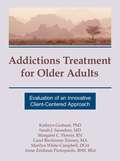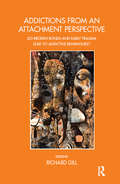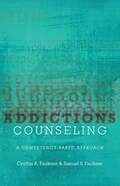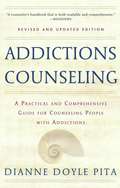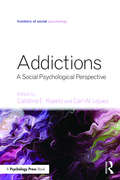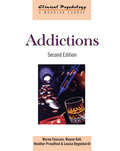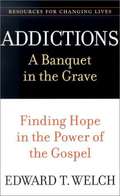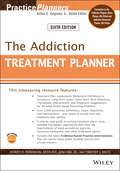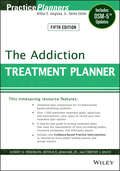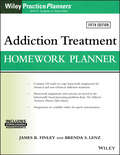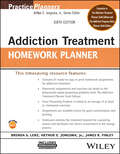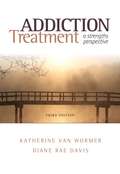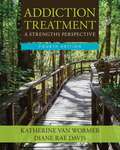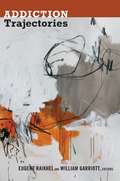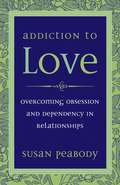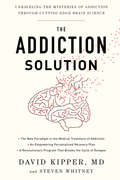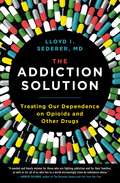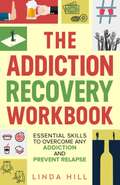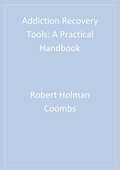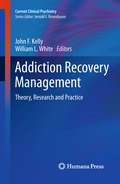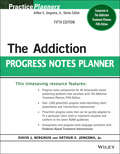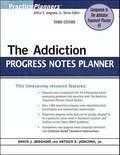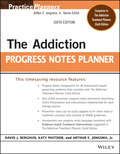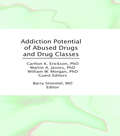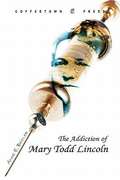- Table View
- List View
Addictions Treatment for Older Adults: Evaluation of an Innovative Client-Centered Approach
by Kathryn Graham Sarah J Saunders Margaret C Flower Carol B Timney Marilyn White-Campbell Anne ZeidmanHere is a detailed description of an innovative approach for treating elderly persons who have alcohol or drug problems. During the past few years there has been growing recognition of the special needs of these individuals. Addictions Treatment for Older Adults describes the evaluation of the Community Older Persons Alcohol (COPA) Program. This book helps readers understand the nature of substance abuse among the elderly, as well as how to identify and intervene with older persons who have alcohol and drug problems, including persons who are reluctant to seek treatment. Addictions Treatment for Older Adults explains the development of the COPA program and how it works. Many case studies and tables provide illuminating details for readers who work with this elderly population. Chapters examine characteristics of elderly persons with alcohol or drug problems the typology of COPA clients and their problem areas treatment interventions variables associated with improvement analysis of progress made by clients during and after treatment the factors that seem to predict recoveryThe in-depth descriptions in this book provide much needed information and guidance for professionals striving to meet the treatment and care needs of elderly substance abusers. Addictions Treatment for Older Adults should be read by researchers in the substance abuse field and by persons who work with the elderly, such as community nurses, social workers, and physicians. In this book they will find the best description to date of the nature of alcohol and drug problems among elderly who live in their communities.
Addictions From an Attachment Perspective: Do Broken Bonds and Early Trauma Lead to Addictive Behaviours? (The Bowlby Centre Monograph Series)
by Richard GillThis outstanding book is an important collection of papers from the 2013 John Bowlby Memorial Conference by accomplished clinicians from different modalities who share their experience of working with people with different kinds of addiction. The papers bring together an in-depth understanding that addictions are a response to, and hold the pain of, broken attachments and are best treated within healthy interpersonal relationships. For a long time the person with an addiction has been seen as the problem with society being able to live in denial of the causes. These papers open up innovative and effective ways of working with people troubled by addiction from an attachment-informed perspective. Contributors: Cara Crossan, Richard Gill, Lynn Greenwood, Bob Johnson, Liz Karter, Edward Khantzian, Arlene Vetere, Kate White, Jason Wright
Addictions Counseling: A Competency-based Approach
by Cynthia A. Faulkner Samuel FaulknerWritten by authors with extensive experience as practitioners and educators, this text serves as a straightforward resource for undergraduate and graduate students who have a goal of becoming counselors or therapists in the field of addiction. <p><p>While many books on the subject follow a similar format (i.e., introduction, classification of drugs, theories of counseling, etc.), Addictions Counseling takes one client and follows her through the entire treatment experience-from referral and assessment, all the way through relapse prevention and discharge planning. In following her through the treatment journey, readers are introduced to theories and techniques for approaching each of the topics discussed. This book is a must-read for anybody interested in pursuing a career as an addiction specialist.
Addictions Counseling: A Practical and Comprehensive Guide for Counseling People with Addictions
by Dianne Doyle PitaThis wholly revised and updated edition of Addictions Counseling is widely read by professional counselors as well as ministers, teachers, and nurses. Topics include the counselor's role in recovery, treatment approaches, and sample treatment plans.
Addictions: A Social Psychological Perspective (Frontiers of Social Psychology)
by Catalina E. Kopetz Carl W. LejuezThe current volume brings together social psychological theories and concepts and discusses their relevance to understanding substance use and addiction. It identifies convergence points between traditional perspectives on addiction and social psychological theory and research. This coexistence, which acknowledges the value of the conceptual and methodological advancements in each relevant field and attempts to integrate them, promotes scientific understanding and a more effective prevention and treatment of addiction.
Addictions (Clinical Psychology: A Modular Course)
by Maree Teesson Wayne Hall Heather Proudfoot Louisa DegenhardtThe first edition of Addictions established itself as a valuable resource for students and professionals alike. This authoritative new edition builds on the success of the previous book, incorporating advances in research and practice over the last ten years. The book includes material on: the nature of addiction and who becomes addicted health consequences of alcohol and other drug dependence theories and causes of addiction. The authors, experts in the field, also include new material on the controversy surrounding the possible positive effects of alcohol and cannabis use, the increased risk of interpersonal violence, and new research on theories of addiction. Addictions will be essential reading for students, professionals and researchers seeking state of the art information about this rapidly growing field.
Addictions: A Banquet in the Grave, Finding Hope in the Power of the Gospel
by Edward T. WelchThis book on addictions offers a profoundly biblical analysis of addictive behavior and helps readers face their own addictions.
The Addiction Treatment Planner: Includes Dsm-5 Updates (PracticePlanners #192)
by Arthur E. Jongsma Jr.Clarify, simplify, and accelerate the treatment planning process so you can spend more time with clientsThe Addiction Treatment Planner, Sixth Edition: provides all the elements necessary to quickly and easily develop formal treatment plans that satisfy the demands of HMOs, managed care companies, third-party payers, and state and federal agencies. This valuable resource contains treatment plan components for 48 behaviorally based presenting problems including depression, intimate relationship conflicts, chronic pain, anxiety, substance use, borderline personality, and more. You'll save hours by speeding up the completion of time-consuming paperwork, without sacrificing your freedom to develop customized treatment plans for clients. This updated edition includes new and revised evidence-based objectives and interventions, new online resources, expanded references, an expanded list of client workbooks and self-help titles, and the latest information on assessment instruments. In addition, you'll find new chapters on some of today's most challenging issues- Opiod Use Disorder, Panic/Agoraphobia, Loneliness, and Vocational Stress. New suggested homework exercises will help you encourage your clients to bridge their therapeutic work to home. Quickly and easily develop treatment plans that satisfy third-party requirements. Access extensive references for treatment techniques, client workbooks and more. Offer effective and evidence-based homework exercises to clients with any of 48 behaviorally based presenting problems. Enjoy time-saving treatment goals, objectives and interventions- pluse space to record your own customized treatment plan. This book's easy-to-use reference format helps locate treatment plan components by presenting behavioral problem or DSM-5 diagnosis. Inside, you'll also find a sample treatment plan that conforms to the requirements of most third-party payors and accrediting agencies including CARF, The Joint Commission (TJC), COA, and the NCQA. The Additction Treatment Planner, Sixth Edition: will liberate you to focus on what's really important in your clinical work.
The Addiction Treatment Planner
by Robert R. Perkinson Arthur E. Jongsma Jr. Timothy J. BruceThe bestselling treatment planning system for mental health professionalsThe Addiction Treatment Planner, Fifth Edition provides all the elements necessary to quickly and easily develop formal treatment plans that satisfy the demands of HMOs, managed care companies, third-party payors, and state and federal agencies.New edition features empirically supported, evidence-based treatment interventionsOrganized around 43 behaviorally based presenting problems, including substance use, eating disorders, schizoid traits, and othersOver 1,000 prewritten treatment goals, objectives, and interventions--plus space to record your own treatment plan optionsEasy-to-use reference format helps locate treatment plan components by behavioral problemIncludes a sample treatment plan that conforms to the requirements of most third-party payors and accrediting agencies including CARF, The Joint Commission (TJC), COA, and the NCQA
Addiction Treatment Homework Planner (PracticePlanners #209)
by Arthur E. Jongsma Jr.Help clients suffering from chemical and nonchemical addictions develop the skills they need to work through problems. The Addiction Treatment Homework Planner, Fifth Edition provides you with an array of ready-to-use, between-session assignments designed to fit virtually every therapeutic mode. This easy-to-use sourcebook features: 100 ready-to-copy exercises covering the most common issues encountered by clients suffering from chemical and nonchemical addictions, such as anxiety, impulsivity, childhood trauma, dependent traits, and occupational problems A quick-reference format—the interactive assignments are grouped by behavioral problems including alcoholism, nicotine dependence, and sleep disturbance as well as those problems that do not involve psychoactive substances, such as problem gambling, eating disorders, and sexual addictions Expert guidance on how and when to make the most efficient use of the exercises Assignments that are cross-referenced toThe Addiction Treatment Planner, Fifth Edition so you can quickly identify the right exercise for a given situation or problem All exercises are available online for you to download and customize to suit you and your clients' unique styles and needs
Addiction Treatment Homework Planner (PracticePlanners #209)
by Brenda S. Lenz Arthur E. Jongsma Jr. James R. FinleyA hands-on homework toolkit for mental health practitioners treating clients with substance use disorders In the newly revised sixth edition of the Addiction Treatment Homework Planner, a team of distinguished clinicians delivers a practical and effective resource for clients who wish to keep their therapy and recovery efforts front-of-mind and incorporate them into their daily lives. The activities and homework contained within will assist clients—and the clinicians treating them—to collect real-time data, enabling practitioners to address relevant issues quickly and collaboratively. This Homework Planner is designed as a companion manual to the sixth editions of the Addiction Treatment Planner and Addiction Progress Notes Planner. It focuses on client-centered, assessment-driven, evidence-based treatment in the field of substance use disorder psychotherapy. Each included exercise is designed to: Emphasize the importance of client motivation and increase the knowledge, awareness, and insight of people moving through the addiction recovery process Incorporate a skills component for further instruction in therapy or at home Be completed or processed within individual sessions or – where appropriate – within group therapy sessions and at various levels of careAn indispensable, hands-on resource for counselors, therapists, psychiatrists, psychologists, and other mental health professionals engaged in the treatment of patients with substance use disorders, the Addiction Treatment Homework Planner is a time-saving tool with the potential to improve patient outcomes and increase client engagement.
Addiction Treatment: A Strengths Perspective (Third Edition)
by Katherine Van Wormer Diane Rae DavisThis book covers the biological, psychological, and social aspects of alcoholism, eating disorders, compulsive gambling, and other addictions.
Addiction Treatment: A Strengths Perspective (Fourth Edition)
by Katherine Van Wormer Diane Rae DavisADDICTION TREATMENT covers the biological, psychological, and social aspects of alcoholism, eating disorders, compulsive gambling, and other addictions. The authors bridge the gap between the popular twelve-step and harm-reduction approaches, thus illuminating how you, as a future practitioner, can guide your clients down a trusted path that is tailored towards the client's particular needs. Through a number of first-person narratives about the experience of addiction, you will discover a realism and depth not commonly found in textbooks. Interesting and relevant topics -- such as the case against so-called underage drinking laws and an inside story of working in a casino -- draw you into the material and illustrate the importance of reducing harm within the biopsychological framework that ties the text together.
Addiction Trajectories
by Raikhel Eugene Garriott WilliamBringing anthropological perspectives to bear on addiction, the contributors to this important collection highlight the contingency of addiction as a category of human knowledge and experience. Based on ethnographic research conducted in sites from alcohol treatment clinics in Russia to Pentecostal addiction ministries in Puerto Rico, the essays are linked by the contributors' attention to the dynamics--including the cultural, scientific, legal, religious, personal, and social--that shape the meaning of "addiction" in particular settings. They examine how it is understood and experienced among professionals working in the criminal justice system of a rural West Virginia community; Hispano residents of New Mexico's Espanola Valley, where the rate of heroin overdose is among the highest in the United States; homeless women participating in an outpatient addiction therapy program in the Midwest; machine-gaming addicts in Las Vegas, and many others. The collection's editors suggest "addiction trajectories" as a useful rubric for analyzing the changing meanings of addiction across time, place, institutions, and individual lives. Pursuing three primary trajectories, the contributors show how addiction comes into being as an object of knowledge, a site of therapeutic intervention, and a source of subjective experience. Contributors. Nancy D. Campbell, E. Summerson Carr, Angela Garcia, William Garriott, Helena Hansen, Anne M. Lovell, Emily Martin, Todd Meyers, Eugene Raikhel, A. Jamie Saris, Natasha Dow Schüll
Addiction to Love: Overcoming Obsession and Dependency in Relationships
by Susan PeabodyLove addiction manifests in many forms, from Fatal Attraction-type obsessive lust to less extreme but nonetheless psychologically and emotionally harmful forms. The most common of these is staying in a bad relationship because of a fear of being alone-the "I hate you but don'¬?t leave me" relationship. In ADDICTION TO LOVE, recovering love addict Susan Peabody explains the variety of ways this disorder plays out, from the obsessively doting love addict to the addict who can'¬?t disentangle from an unfulfilling, dead-end relationship. Peabody provides an in-depth and easy-to-follow recovery program for those suffering from this unhealthy and often dangerous addiction and explains how to create a loving, safe, and fulfilling relationship.A seminal work on unhealthy and obsessive behaviors in love, and how to change behavior to have a positive relationship. This third edition includes a new introduction and revisions to the text throughout.Some symptoms of love addiction include love at first sight, excessive fantasizing, abnormal jealousy, nagging, and accepting dishonesty.Even relationships with parents, children, siblings, or friends may be addictive-dependency is not always related to romantic love.Previous editions have sold more than 40,000 copies."Love addiction is a three-headed serpent that Susan Peabody adeptly slays. This is the quintessential book for any love addict or counselor needing to fully understand this highly prevalent and complex disorder. Susan detects and dissects aspects of this condition not comprehended in other books of its kind. Recovery is possible. This book makes it possible to take the succinct steps necessary toward a loving and reciprocal long-term intimate relationship."-Sudi Scull, M.F.T., C.N., psychotherapist and nutritionistFrom the Trade Paperback edition.
The Addiction Solution: Unraveling the Mysteries of Addiction through Cutting-Edge Brain Science
by David Kipper Steven WhitneyA revolutionary and empowering paradigm in treating addiction based on groundbreaking new science.For decades addiction has been viewed and treated as a social and behavioral illness, afflicting people of "weak" character and "bad" moral fiber. However, recent breakthroughs in genetic technology have enabled doctors, for the first time, to correctly diagnose the disease and prove that addiction is an inherited, neuro-chemical disease originating in brain chemistry, determined by genetics, and triggered by stress.In their groundbreaking The Addiction Solution, David Kipper, MD, and Steven Whitney distill these exciting findings into a guide for the millions of adults who want to be free from the cycle of addiction, and for their loved ones who want to better understand it and to help. It draws on composite case histories to illustrate how the innovative Personal Recovery Program works by customizing treatment for a diverse group of addicts abusing a wide variety of different substances—from the first day of treatment to its successful resolution. The result is a complete guide to a world made brand-new by this enormous paradigm shift in the treatment of addiction.
The Addiction Solution: Treating Our Dependence on Opioids and Other Drugs
by Lloyd SedererA groundbreaking examination of addiction from a psychiatrist and public health doctor, offering practical, proven solutions for individuals, families, and communities dealing with substance use and abuse.Written with warmth, accessibility, and vast authority, The Addiction Solution is a practical guide through the world of drug use and abuse and addiction treatment. Here, Lloyd I. Sederer, MD, brings together scientific and clinical knowledge, policy suggestions, and case studies to describe our current drug crisis and establish a clear path forward to recovery and health. In a time when so many people are affected by the addiction epidemic, when 142 people die of overdoses every day in the United States, principally from opioids, Sederer’s decades of wisdom and clinical experience are needed more than ever before. With a timely focus on opioids, Sederer takes us through the proven essentials of addiction treatment and explains why so many of our current policies, like the lingering remnants of the War on Drugs, fail to help drug users, their families, and their wider communities. He identifies a key insight, often overlooked in popular and professional writing about addiction and its treatment: namely, that people who use drugs do so to meet specific needs, and that drugs may be the best solution those people currently have. Writing with generosity and empathy about the many Americans who use illicit and prescribed substances, Sederer lays out specific, evidence-based, researched solutions to the prevention and problems of drug use, including exercise, medications, therapy, recovery programs, and community services. In this challenging time, The Addiction Solution provides practical help, comfort, and hope.
The Addiction Recovery Workbook: Essential Skills to Overcome Any Addiction and Prevent Relapse
by Linda HillAddiction recovery requires a rewiring of your mind and a strong commitment to change. This can be a challenging process, but with the right guidance, a life free from the suffocating grip of addiction is within reach. <P><p> The Addiction Recovery Workbook provides the structured and proven frameworks that you need to follow to achieve lasting results. This guide: <p>• Explains the science behind addiction, how it affects the brain, and how to overcome it. <p>• Outlines common symptoms of addiction so you can become aware of them before they worsen. <p>• Identifies risk factors for addiction so you don’t self-sabotage your recovery. <p>• Provides in-depth information on Cognitive Behavioral Therapy (CBT) and its various techniques that have helped countless people end their addictions. <p>• Guides readers through the principles of <p>• Acceptance and Commitment Therapy (ACT) and how to use mindfulness, cognitive diffusion, and value clarification. <p>• Explains Exposure and Response Prevention Therapy (ERP) that will help you manage even the most powerful cravings. <p>• Covers the causes of relapse and how to prevent it, including tips for avoiding triggers and maintaining a healthy lifestyle. <p>• Explains how to build your support networks during recovery, including practical advice for building and maintaining positive relationships. <p>• Offers case studies and real-world examples to illustrate the concepts and techniques covered in the book. <P><p> This comprehensive guide offers practical, evidence-based techniques and exercises that will help you gain insight into your addiction and develop the skills you need to overcome it. <P><p> Explore all aspects of addiction recovery, including self-awareness, stress management, mindfulness, communication skills, and more. With interactive activities and journal prompts, readers will deepen their understanding of addiction and develop the skills needed for recovery. <P><p> Whether you're seeking to overcome addiction yourself or seeking to help a loved one, The Addiction Recovery Workbook is an essential tool for anyone looking to take back control of their life.
Addiction Recovery Tools: A Practical Handbook
by Dr Robert Holman CoombsAddiction Recovery Tools: A Practical Handbook presents verified recovery tools with a methodical "when and how" approach for each available tool. Including both Western and Eastern methods, the book catalogs the motivational, medical-pharmaceutical, cognitive-behavioral, psychosocial, and holistic tools accessible in a wide variety of settings and programs.
Addiction Recovery Management: Theory, Research and Practice (Current Clinical Psychiatry)
by John F. Kelly William L. WhiteAddiction Recovery Management: Theory, Research, and Practice is the first book on the recovery management approach to addiction treatment and post-treatment support services. Distinctive in combining theory, research, and practice within the same text, this ground-breaking title includes authors who are the major theoreticians, researchers, systems administrators, clinicians and recovery advocates who have developed the model. State-of-the art and the definitive text on the topic, Addiction Recovery Management: Theory, Research, and Practice is mandatory reading for clinicians and all professionals who work with patients in recovery or who are interested in the field.
The Addiction Progress Notes Planner (PracticePlanners #199)
by David J. Berghuis Arthur E. Jongsma Jr.Save hours of time-consuming paperwork The Addiction Progress Notes Planner, Fifth Edition provides prewritten session and patient presentation descriptions for each behavioral problem in the Addiction Treatment Planner, Fifth Edition. The prewritten progress notes can be easily and quickly adapted to fit a particular client need or treatment situation. Saves you hours of time-consuming paperwork, yet offers the freedom to develop customized progress notes Organized around 44 behaviorally based presenting problems including depression, gambling, nicotine abuse/dependence, chronic pain, and eating disorders Features over 1,000 prewritten progress notes summarizing patient presentation, themes of session, and treatment delivered Provides an array of treatment approaches that correspond with the behavioral problems and DSM-5 diagnostic categories in The Addiction Treatment Planner, Fifth Edition Offers sample progress notes that conform to the latest ASAM guidelines and meet the requirements of most third-party payors and accrediting agencies, including CARF, TJC, COA, and the NCQA Incorporates new progress notes language consistent with Evidence-Based Treatment Interventions
The Addiction Progress Notes Planner
by David J. Berghuis Arthur E. Jongsma Jr.PracticePlanners: The Bestselling treatment planning system for mental health professionalsThe Addiction Progress Notes Planner, Third Edition contains complete prewritten session and patient presentation descriptions for each behavioral problem in The Addiction Treatment Planner, Fourth Edition. The prewritten progress notes can be easily and quickly adapted to fit a particular client need or treatment situation.Saves you hours of time-consuming paperwork, yet offers the freedom to develop customized progress notesOrganized around 44 behaviorally based presenting problems, including depression,gambling, nicotine abuse/dependence, anxiety, and eating disordersFeatures over 1,000 prewritten progress notes (summarizing patient presentation, themes of session, and treatment delivered)Provides an array of treatment approaches that correspond with the behavioral problems and DSM-IV-TRTM diagnostic categories in The Addiction Treatment Planner, Fourth EditionOffers sample progress notes that conform to the requirements of most third-party payors and accrediting agencies, including CARF, The Joint Commission (TJC), COA, and the NCQAPresents new and updated information on the role of evidence-based practice in progress notes writing and the special status of progress notes under HIPAA
The Addiction Progress Notes Planner (PracticePlanners)
by Arthur E. Jongsma Jr.An invaluable practice resource for practitioners engaged in addictions treatment In The Addiction Progress Notes Planner, Sixth Edition, a team of distinguished mental health professionals delivers complete, pre-written session and patient presentation descriptions for every behavioral problem in the Addictions Treatment Planner, Sixth Edition. Each note can be simply and quickly adapted to fit a real-world client need or treatment situation while remaining completely unified with the client’s treatment plan. This new edition offers new and revised evidence-based objectives and interventions organized around 46 behavior-based presentations, including alcoholism, nicotine dependence, substance abuse, problem gambling, eating disorders, and sexual addictions. The resource also offers: A wide array of treatment approaches that correspond to the behavioral problems and DSM-V diagnostic categories included in the Addiction Treatment Planner, Sixth Edition Sample progress notes conforming to the requirements of most third-party payors and accrediting agencies, including CARF, TJC, COA, and the NCQA Brand-new chapters on Opioid Use Disorder, Panic/Agoraphobia, and Vocational StressThe Addiction Progress Notes Planner is an indispensable practice aid for addictions counselors, mental health counselors, social workers, psychologists, psychiatrists, and anyone else treating clients suffering from addictions.
Addiction Potential of Abused Drugs and Drug Classes
by Barry StimmelIncrease your awareness of the relative addiction liabilities of various drugs and drug classes that are commonly abused. A timely and masterful new book, Addiction Potential of Abused Drugs and Drug Classes clarifies, in contemporary terminology, the state of addiction liability of cocaine, opiates, alcohol, sedative-hypnotics, nicotine, anxiolytics, marijuana, inhalants and anesthetics, and PCP and hallucinogens--the nine drugs that are most abused today. Authorities combine their research expertise with the available scientific literature to evaluate those factors which contribute to the addictive qualities of drugs. Specific chapters highlight the positive and negative reinforcement qualities that make drugs rewarding, focus on the two major subtypes of alcoholics, and cover the neuroanatomical and neurochemical bases of psychological dependence, the greatest contributing factor to drug addiction. An essential new resource for scientists, clinicians, and administrators, Addiction Potential of Abused Drugs and Drug Classes also highlights those areas where more work is needed in order to understand how individual drugs affect the processes of dependence, tolerance, and addiction, so that adequate treatment of these disorders can be discovered.The book was written for teachers and researchers in the chemical dependency field, to provide an up-to-date review of the literature. In addition, physicians, nurses, and pharmacists will find the book to be valuable as an update on the relative addiction strengths of abused drugs. Finally, treatment counselors and professionals with some knowledge of physiology and pharmacology will be interested in the book because of its relevance to the clinical treatment of chemically-dependent patients.
The Addiction of Mary Todd Lincoln
by Anne E. BeidlerMary Todd Lincoln, wife of the president we have immortalized, has always been difficult for us to understand. She could appear poised and brilliant one moment yet rude and ugly the next. Sometimes competent and strong, able to entertain dignitaries from around the world, at other times she appeared dependent and weak. At times she seemed utterly beside herself with sobbing and screaming. Historians have mostly avoided saying very much about Mary Todd Lincoln except in reference to her husband, Abraham. To many it would seem that Mary Todd Lincoln is still an embarrassment in the tragic story of her martyred husband. But Mary Todd Lincoln lived her own tragic story even before Abraham was murdered. She was an addict, addicted to the opiates she needed for her migraine headaches. Seeing Mary Todd Lincoln as an addict helps us understand her and give her the compassion and admiration she deserves. In her time there had been no courageous First Lady like Betty Ford to help people understand the power of addiction. There was no treatment center. In Mary Todd Lincoln's time there were many addicts at all levels of society, as there are now, but it was a more socially acceptable condition for men to have than for women. More importantly, addiction was not very well understood, and it was often mistreated. Because Mary Todd Lincoln's only surviving son, Robert Lincoln, made a great effort to protect his mother and his family from journalists and historians, he intentionally destroyed most of Mary Todd Lincoln's medical records and many of her letters. What he could not destroy, however, is the record of Mary Todd Lincoln's pain and the record of how she behaved while living with this pain. In The Addiction of Mary Todd Lincoln, we can see clearly, for the first time, what Mary Todd Lincoln had to live with and the courage it took for her to carry on.
